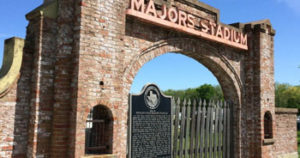
Main Gate to Majors Stadium, home of the Greenville Majors baseball team and other local teams between 1925 and 1957. Many believe that Sunday closings due to Blue Laws limited the number of paying spectators. Going to a Sunday afternoon game was impossible. (Dallas Morning News)
The last semester of my senior year at Midwestern State University I discovered that I needed a car to get to my assigned school for student teaching. Wichita Falls had, and probably still has, an outstanding public transportation system, but, it did not go into the area where my school was. So my dad came to get me on Sunday and we drove to Jacksboro to buy a car. At that time one could not drive into a car dealership and purchase a car on Sunday. Thank goodness my dad knew the dealer well, he promised to come by the next day with a check, and I drove off to my student teacher assignment in a four-cylinder Pontiac. My friends referred to it as the “sewing machine.”
Why not buy a car on Sunday? Because Texas had and still has a Blue Law that forbids such transactions. Blue Laws have been around since the American colonies in various forms. Puritan laws in the northeast forbid any unnecessary labor on the Sabbath. As the Industrial Revolution grew in America, workers were allowed Sunday off. It was a time among other things that children were taught basic learning skills in Sunday Schools near the industries.
By 1863 Blue Laws were established here in Texas. It doesn’t appear to have anything to do with the Civil War, although slaves weren’t allowed to work on Sundays. But there was no horse racing on Sunday either.
Baseball historians attribute the lack of success in Greenville baseball teams to Blue Laws. During the early 20th century numerous teams sprang up there but seldom had the needed financial support. The best fans were farmers, tenants and owners, whose only day off was Sunday. But baseball and other sporting events were on the list of Sunday closings, at least here in Greenville.
In 1961 Blue Laws were codified and signed into law by Governor Mark White. Among the forty-two categories of goods not sold on Sundays in Texas were clothing, footwear, utensils, baby bottles, electric fans and air-conditioners, radios, clocks, tools but not hand tools, nails and screws, jewelry, watches, toys but no novelties or souvenirs, and lawn mowers. The penalty for selling such items was $100 to $500 and/or up to six months in jail. Therefore, opening a business on Sunday was simply impractical.
By the 1970s department stores and theaters were finding ways to side-step Blue Laws. Items not for sale were covered with cloth or paper. Some items were considered “emergency items” and sold if an emergency existed. Yet what is an emergency for me might not be an emergency for my neighbor.
Other storekeepers favored Blue Laws. They believed it allowed family time for employees. Others feared the cost of opening a seventh day each week.
Finally the vast majority of goods listed on Blue Laws ended in 1985. Ironically the law went into effect on September 1, the same day that the use of seat belt laws went into effect. But to this day there are a few items not sold on Sundays. I still can’t buy a car, even a four-cylinder Pontiac on Sunday. Beer and wine cannot be sold before noon on Sunday. Have you tried to shop in a liquor store on Sunday? No way; they too are closed all day Sunday.
